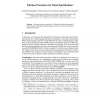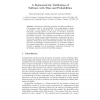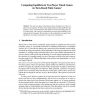147
click to vote
FORMATS
2010
Springer
15 years 10 days ago
2010
Springer
This paper considers the model of Time Petri Nets (TPNs) extended with time parameters and its use to perform on-line diagnosis of distributed systems. We propose to base the metho...
114
Voted
FORMATS
2010
Springer
15 years 10 days ago
2010
Springer
SMT solvers have traditionally been based on the DPLL(T) algorithm, where the driving force behind the procedure is a DPLL search over truth valuations. This traditional framework ...
99
Voted
FORMATS
2010
Springer
15 years 10 days ago
2010
Springer
This paper presents extensions of Safraless algorithms proposed in the literature for automata on infinite untimed words to the case of automata on infinite timed words.
107
click to vote
FORMATS
2010
Springer
15 years 10 days ago
2010
Springer
In an expected reachability-time game (ERTG) two players, Min and Max, move a token along the transitions of a probabilistic timed automaton, so as to minimise and maximise, respec...
140
click to vote
FORMATS
2010
Springer
15 years 10 days ago
2010
Springer
Abstract. Probabilistic timed automata are an extension of timed automata with discrete probability distributions. Simulation and bisimulation relations are widely-studied in the c...
135
click to vote
FORMATS
2010
Springer
15 years 10 days ago
2010
Springer
Abstract. We consider temporal logic formulae specifying constraints in continuous time and space on the behaviors of continuous and hybrid dynamical system admitting uncertain par...
112
click to vote
FORMATS
2010
Springer
15 years 10 days ago
2010
Springer
Abstract. Quantitative verification techniques are able to establish system properties such as "the probability of an airbag failing to deploy on demand" or "the exp...
143
click to vote
FORMATS
2010
Springer
15 years 10 days ago
2010
Springer
Abstract. We investigate layered composition for real-time systems modelled as (networks of) timed automata (TA). We first formulate the principles of layering and transition indep...
161
Voted
FORMATS
2010
Springer
15 years 10 days ago
2010
Springer
We present a general approach to combine symbolic state space representations for the discrete and continuous parts in the synthesis of winning strategies for timed reachability ga...
145
click to vote
FORMATS
2010
Springer
15 years 10 days ago
2010
Springer
We study two-player timed games where the objectives of the two players are not opposite. We focus on the standard notion of Nash equilibrium and propose a series of transformation...



